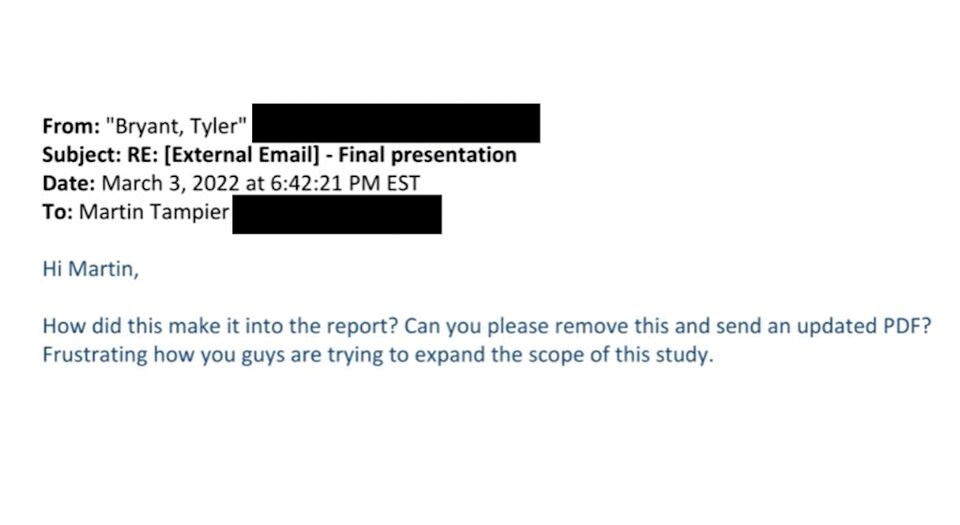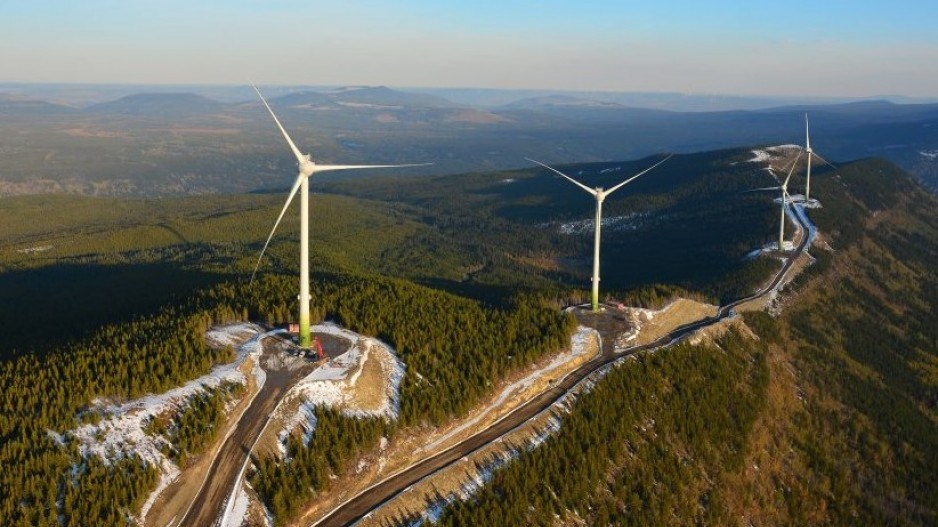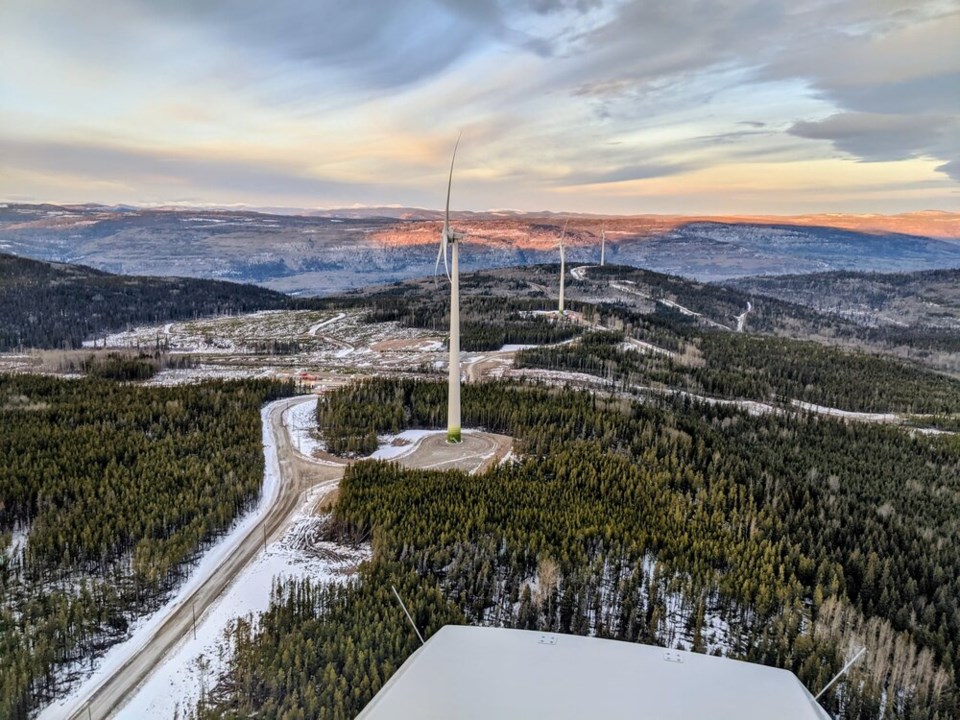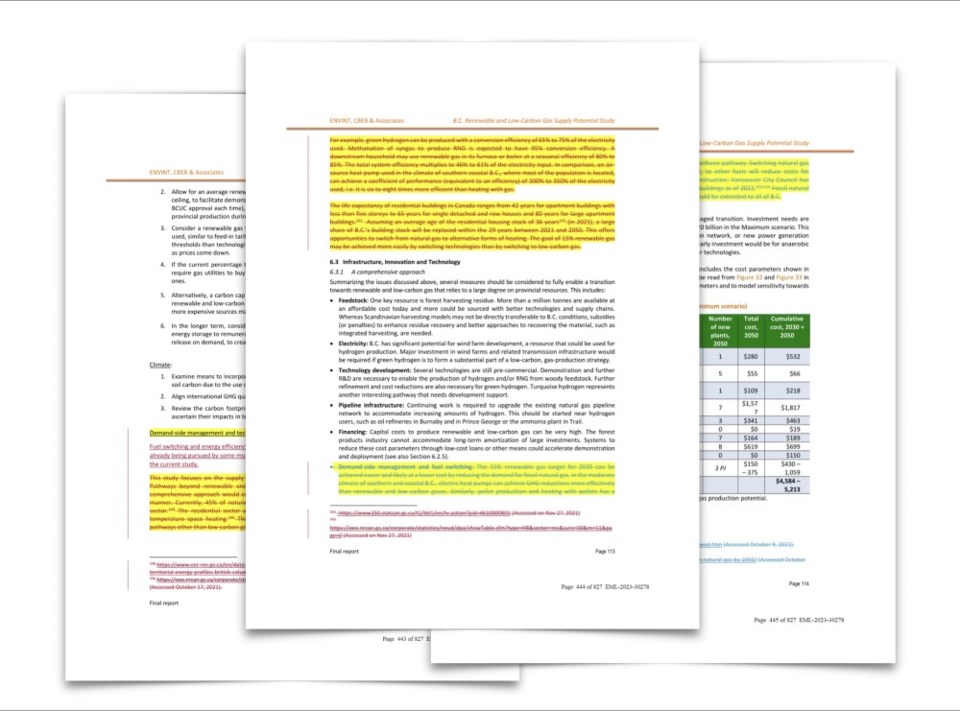A report weighing the role gas could play in B.C.’s clean energy transition was edited to remove sections stating electrification and heat pumps are a more efficient path to decarbonize the province, documents obtained through a freedom of information request show.
The study, which looked at the future supply of renewable and low-carbon gas, was first published in early March 2022 on commission from FortisBC, the B.C. Ministry of Energy, Mines and Low Carbon Innovation, and the BC Bioenergy Network, a research group created with a grant from the province and housed at the University of British Columbia.
On March 3, the report was circulated in a press release seen by a number of municipalities. Nine days later, the document was replaced online with several passages removed.
One jettisoned section praises the efficiency of electric heat pumps, stating they are “six to eight times more efficient than heating with gas” — a figure close to what's reported by BC Hydro and the International Energy Agency.
Another section struck from the report says the City of Vancouver’s plan to phase out natural gas should be extended across the province.
Other statements appear to have been altered to paint a more neutral picture of future gas demand. The report initially warned that beyond 2030, changes in industrial and building sectors “may lead to shrinking pipeline gas sales…” It was later modified to say those industry trends “may change the volume of energy delivered in the gas system.”
Emails obtained by Glacier Media in a freedom of information request appear to show Tyler Bryant, FortisBC’s strategic advisor for climate change and energy, initiating the removal of the passages because they were “out of scope” of the study. In a email sent March 3, Bryant flags several passages for removal.
“In the moderate climate of southern and coastal B.C., electric heat pumps can achieve GHG reductions more effectively than renewable and low-carbon gases,” reads one that was later redacted from the report.
The documents show no effort on behalf of the province to block their removal.

Diana Sorace, FortisBC's senior advisor for corporate communications, confirmed the company had edited sections of the report with other members of the steering committee because they were “out of scope, inaccurate or could not be substantiated by data reviewed during the study.”
Citing a “diversified approach” to meet B.C.'s climate goals, Sorace said decarbonizing the gas system would offer customers an expanded choice at a time when BC Hydro estimates it needs to add about 3,000 GWh of new electricity capacity by 2029 — roughly equal to heating 270,000 homes.
“Shutting out an existing safe, reliable and affordable energy delivery system, is not the answer,” stated Sorace in an email.
The deletions have raised concerns for experts and leaders in some jurisdictions across B.C. as they weigh policies that would accelerate a shift away from natural gas.
A City of Richmond call to accelerate the phase out of gas heating in buildings recently prompted Metro Vancouver’s board to vote in favour of opening up talks with the province, despite opposition from FortisBC.
A similar debate is playing out on Vancouver Island, where representatives from the private utility have cited the edited report as evidence for gas’s potential staying power. Nanaimo city councillor Ben Geselbracht said the deletions raised serious concerns over the independence of a report touted as neutral and backed by the province.
“It's very misleading,” Geselbracht said. “Omission of information is lying in any type of relationship.”
“If those specific recommendations were presented to our council, we probably would have near unanimous support to not go the natural gas route.”
Martin Tampier, who was commissioned to lead the study, said the deleted references to electrification and heat pumps should have never appeared in the report, and that “the omission was a joint decision of the steering committee.”
“This is not lying by omission,” added BC Bioenergy Network director Scott Stanners. “That information was out of scope. It is a serious misrepresentation to claim this is lying.”
The Ministry of Energy, Mines and Low Carbon Innovation was given over a week to comment on the deletions but had not responded by publication time.
A battle between gas and hydro
In the average B.C. home, 98 per cent of greenhouse gas emissions come from gas, and at the city level, building emissions are usually a municipality’s first or second largest source of carbon pollution alongside transportation.
A desire to lower those emissions has prompted a conversation hinging on two solutions: a push toward full electrification or some future that makes room for gas, particularly renewable natural gas (RNG) — a catch-all term to describe all methane captured from wastewater treatment plants, landfills, wood waste and manure from farm animals.
Like conventional natural gas, RNG is mostly methane. By capturing that methane before it seeps into the air, one can theoretically prevent the release of a greenhouse gas over 80 times more potent than carbon dioxide over a 20-year period.
Advocates of RNG promote it as a carbon-neutral solution that doesn't require a massive overhaul of public and private infrastructure. FortisBC says it wants 15 per cent of its natural gas supply to come from renewable sources by 2030, claiming it will reduce customer emissions by 30 per cent.
By including gas in B.C.’s move away from fossil fuels, the company says it will cost $100 billion less by mid-century compared to outright electrification, while still enabling the province to meet its emissions targets. BC Hydro, on the other hand, says it is looking to close its 3,000-GWh energy shortfall with renewable technologies like wind and solar, spokesperson Kevin Aquino said.

Some B.C. cities have found gas is far from the solution Fortis has made it out to be. A 2020 analysis commissioned by the City of Nanaimo found the community’s carbon pollution outpaced population growth between 2010 and 2017.
Over those seven years, natural gas use in the building sector grew 55 per cent, 11 times more than an increase in electricity usage, and part of a long-term shift from electricity to natural gas use since its arrival on Vancouver Island in the 1990s, notes the report.
“As natural gas produces 16x more emissions than BC Hydro electricity for an equivalent unit of energy, this shift has profound implications for Nanaimo’s ability to reach its climate targets,” notes a backgrounder to council.
FortisBC did not respond to claims its incentives to opt for gas hook-ups in new buildings have driven up emissions.
To meet its emission reduction targets, in May, city staff recommended council adopt a Zero Carbon Step Code — a proposal that allows municipalities to target the carbon output of new buildings while in operation. The step code would push builders to drop carbon pollution through the installation of low-carbon heat pumps or by building more efficient buildings.
FortisBC opposed adopting the code, calling for more consultation. But on July 26, council decided to send the proposal for to a vote in September.
Edited report evidence of wider disinformation campaign, say critics
In the months after releasing the edited study, FortisBC appears to have set out on a campaign to extoll the future of RNG in B.C.
One sponsored content advertisement described RNG as “the easy way” to lower your carbon footprint. FortisBC’s director of energy solutions Jason Wolfe is quoted saying customers “want to be able to choose for themselves.”
Wolfe took that same message to municipalities — in Penticton, where the gas utility proposed hooking up all new future homes to RNG, and to Nanaimo, where Wolfe used the edited report’s findings to reiterate the argument that British Columbians should have the choice to choose what heats their homes.
“It's tapping into this whole ‘freedom — not having government take away our choice’ narrative,” said Geselbracht.
Environmental groups have criticized fossil fuel companies such as Fortis for a coordinated marketing campaign that places too much emphasis on the role of natural gas as the world works to decarbonize.
In September 2022, the Canadian Association of Physicians for the Environment filed a complaint with Canada's Competition Bureau against the Canadian Gas Association for “false and misleading” statements it made in an advertising campaign that praised gas as an "eco-friendly" fuel.
The industry organization, which counts FortisBC as a member, was also indirectly cited in an investigation into the International Gas Union, an umbrella organization alleged to have created a global disinformation playbook intended to shape the role of gas in the face of climate action.
The internal documents break down a messaging playbook for every region of the world, tailoring messaging around the promotion of gas based on the “environmental-consciousness” of the market.

The North American playbook includes messaging stating that as electricity prices climb, Canada and the U.S. will become gas exporters making energy bills more affordable. The playbook also recommends members should tout gas’s “essential” role in ensuring energy security and “balancing the intermittency of renewables.”
Peter Russell, Richmond’s director of sustainability and district energy, said city staff have noticed how fossil fuel companies have repeated marketing strategies in different jurisdictions.
Together with the other BC Utilities Commission intervenors, the city hired energy consultant Peter Strunk — a New York-based expert who has spent years tracking the oil and gas industry — to systematically unravel FortisBC’s argument RNG should be used in all new buildings.
Sorace said FortisBC backs the B.C. government's goals to decarbonize, but that there's a lot of uncertainty that BC Hydro can ensure there's enough electricity supply to feed the province's growing demand. The company spokesperson said that's one reason why several references to the advantage of electricity were removed from the report.
"There is no debate that B.C. needs more electricity than we have today," said Sorace.
But Russell said the deletions in the gas potential report are just one more data point showing the company is manufacturing a conversation that suits its long-term goals.
“If there's an omission that plays down or eliminates an issue that gets in the way of FortisBC’s survival, that's concerning,” Russell told Glacier Media.
Known PR strategies used: expert
So far, only a handful of B.C. cities have devoted staff resources to uncover evidence questioning claims from B.C.’s big utilities. Geselbracht worries many other smaller municipalities don’t have the time or resources to hire or carry out their own fact-finding missions. That, he says, could leave them open to disinformation.
“As it's showing in this report, there's actual independent recommendations that were made that clearly say that the renewable natural gas, natural gas just can't compete from an energy efficiency and emissions reduction standpoint — and that's being withheld,” he said.
“How are we supposed to make proper fact-based policy decisions in this type of environment?”
Melissa Aronczyk, a Rutgers University professor of media studies, says it’s a problem facing municipalities across the globe, many of which want to lower and eliminate big sources of carbon pollution but are being presented with competing worldviews.
Aronczyk, who recently authored the book A Strategic Nature: Public Relations and the Politics of American Environmentalism, has spent years tracking the PR strategies corporations and politicians use to reshape the narrative around environmental problems.
In most cases, the Canadian researcher says that strategy involves muddying the waters by downgrading and undermining existing climate solutions.

After reviewing the edited gas study and advertising surrounding it, Aronczyk said she spotted a number of familiar PR strategies recycled by fossil fuel companies.
She pointed to the tactic of highlighting a “potential” to scale up RNG with no scale yet. Aronczyk says FortisBC has also attempted to engage in “solutionism" by positioning itself as a climate leader, and pulling on customers’ patriotic or nationalist sentiments by saying Canadian gas is more ethical (even though much of FortisBC’s RNG is likely to be sourced and burned outside of B.C.).
What’s different this time, Aronczyk said, is a paper trail of competing evidence removed by the steering committee.
“The information that was suppressed in that report would have changed the overall narrative,” she said. “It's the presentation of a single perspective.”
Read the second in this two-part series: FortisBC's plan to keep burning gas 'not equitable,' claims B.C. city





